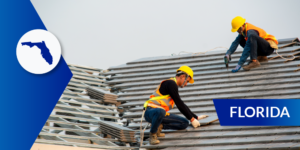
Roofing scams are a hot topic in Florida this week as lawmakers gather in Tallahassee to discuss the state’s looming insurance crisis.
In recent years, Florida homeowners have seen rising premiums, canceled policies, and a rapidly dwindling number of insurance options as carriers collapse or leave the state entirely.
Many insurers have pointed to the rising frequency of roofing scams as a significant source of their financial trouble, but other groups claim it’s not that simple.
With hurricane season rapidly approaching, the insurance market’s uncertainty could spell rough waters for restoration contractors in Florida.
Related coverage: Florida Property Insurance Crisis Poses Risk to Restoration Contractors
The property insurance market in Florida has reached a boiling point
There are a number of reasons why the Florida property insurance market is hurting.
Four of the six most costly hurricanes on record have hit the US in the last five years. Construction costs have soared at rates not seen since the 1970s thanks to supply chain disruptions. And now, roofing scams are racking up litigation fees and settlements of an untold number.
Many insurance companies are blaming roofing scams for their financial woes.
In these scams, the alleged setups go as follows: A roofing contractor knocks on unsuspecting homeowners’ doors and offers a free roofing inspection. Those that are granted access will claim to locate damage, even if the roof is perfectly fine.
The contractors will then try to convince the homeowner to sign an assignment of benefits form, which allows the contractor to file an insurance claim, under the promise of a free roof.
After filling a claim, the subsequent inspection by the insurance company will likely turn up little to no damage, as the contractor’s initial inspection was entirely fraudulent. When the insurance company’s payout is far less than what the contractor requested, the contractor will then sue the insurance company without the homeowner’s permission.
The insurance company is left to decide whether to fight the legal battle, incur costly legal fees, or simply settle. In either situation, the insurance company has to pay up.
Even though the homeowner might end up with a “free” roof, everyone else ends up with insurance higher premiums in the long run.
“Ultimately, the victim is every Floridian who is buying their neighbors’ roofs,” said Florida state Senator Jeff Brandes.
While roofing scams are certainly a pervasive problem in Florida, some groups say the insurance companies’ claims about the impact of roofing scams are exaggerated.
“A lot of this is brought upon themselves,” said Orlando insurance attorney Tyler Chasez.
According to Chasez — and legal organizations such as the Florida Justice Association — the state’s insurers should blame their own poor management for their demise, and claim they are capitalizing on the roofing scam narrative to reduce their obligation to honor legitimate claims.
Regardless of which factor is the most at fault, this tumultuous period as a whole might explain why Florida insurance companies have seen rapidly increasing losses in the last five years. In 2017, the state’s insurance market reported a total negative net income of $92 million. But by last year, that figure skyrocketed to over $1 billion.
A rising number of insurance companies have declared bankruptcy or abandoned the state entirely during this same period. As a result, many Florida policyholders have seen their premiums increase or their policies canceled outright. Those lucky enough to find a new provider have been met with higher levels of scrutiny, if they can find one willing to take them at all.
Florida Governor Ron Desantis recently called a special session for lawmakers to address this volatile situation, which began on Monday, May 23. Legislators will debate a $2 billion proposal to create a reinsurance fund and put new restrictions on attorney fees and coverage denials.
What this could mean for restoration contractors in Florida
Unfortunately, volatility is rarely good for business. Hurricane season is just around the corner, which would ordinarily lead to an increase in homeowner insurance claims and restoration work due to storm and flood damage.
But unless Florida lawmakers can find a solution to the property market’s issues, it’s not clear if the higher rates, canceled policies, and a limited number of insurance options will impact homeowners’ willingness (or ability) to file claims for restoration work.
Homeowners might think twice about filing an insurance claim for a damaged window or a flooded garage if it means their policies will increase dramatically, if it’s even covered at all. This could result in less restoration work than usual.
Insurance disputes can also jeopardize payment for restoration work, at least temporarily. Fortunately, an insurance dispute or even a provider’s bankruptcy shouldn’t disrupt a contractor’s right to payment for work completed.
Although contractors who deal in restoration and repair work face unique payment challenges, mechanics liens offer the best way to secure the right to payment, regardless of who ends up paying for the work.